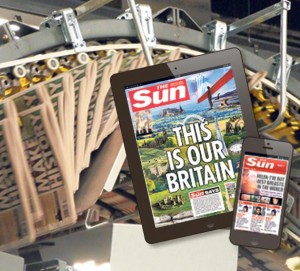Newspapers in a digital age: moving with the times and charging for it
 For most of us the digital revolution started some time ago. Working in journalism for nearly 15 years means that I have seen things change enormously, but even back in the late 1990s it was clear that the web was where it was at -- or where it was going to be. Newspapers and magazines have had to adapt to fight for ever-decreasing audiences in a changing market. But not everyone has been moving at the same pace, or has quite the same idea about how things should work.
For most of us the digital revolution started some time ago. Working in journalism for nearly 15 years means that I have seen things change enormously, but even back in the late 1990s it was clear that the web was where it was at -- or where it was going to be. Newspapers and magazines have had to adapt to fight for ever-decreasing audiences in a changing market. But not everyone has been moving at the same pace, or has quite the same idea about how things should work.
The ease of self-publishing and the low overheads associated with running a website, in conjunction with the always-on, instant updateability of the internet has seen the sales of newspapers and magazines dropping off. Most titles have gone with the flow and have developed an online presence, but the need for publishers to make money is at odds with the widely held belief that everything online should be free.
A newspaper really does need to have a website. It is expected of it. But when you're trying to sell real, physical newspapers for actual money, the prospect of making the same content available online free of charge seems counter-intuitive. But this is exactly what many British newspapers did for many years.
Obviously money needs to be made, and advertising plays an important role here. To help bring in additional revenue some newspaper sites started to charge for access to major stories -- taking out a subscription provides access to additional content. But when something has been available free of charge for so long, a switch to a subscription model can be hard for readers to swallow.
Of course, the erection of paywalls is far from restricted to the UK. In the US, the Wall Street Journal makes some of its content available to all, while a good portion is left so it can only be read by subscribers. There is a very similar setup at the New York Times.
Subscription models are nothing new and they have proved to be flexible. When Hurricane Sandy hit, both sites dropped their paywalls to provide free access to information.
One of the biggest supporters of paywalls is the Murdoch group. The Times -- one of the most respected newspapers in the world -- now just gives a taster of articles for free, with full access being limited to paid-up subscribers.
It should come as no surprise that other titles from the same stable chose to go down the same route, and the Sun -- still the UK's most popular newspaper -- is the next in line to disappear behind a paywall.
In an astounding piece of editorial, the Sun sets out its manifesto and explains its view of the state of the nation.
There is nothing remotely unusual about a newspaper nailing its colours to the mast, but here there is a slightly different approach. The article starts by focusing on changing technology, the prevalence of tablets and smartphones and the widespread availability of broadband. For the rest of the publishing world, this is not news, but the Sun sees these wonders as being 'just around the corner'.
So why the sudden interest in technology? Why so keen to be seen to embrace the change that it brings? Perhaps unsurprisingly it is because of other changes. Sun+ is the Sun's subscription-based online portal. It is a massive change for a big website that has been free for many years. Whether audience figures fall, rise or remain constant is something only time will tell, but I see the paper's lauding of technology rather more cynically.
The declaration that "we love gadgets, we love the freedom and the fun they bring, we love apps" doesn’t sound sincere -- it sounds out of touch, old fashioned, and several years too late. It sounds like your great-grandmother pretending to be interested in your computer.
 The Sun's rebranding has a feel of a Trojan attack (in the historical sense, not a virus attack). The editorial spouts purple prose about the paper's support for Britain and everything it believes to be great about it. It purports to be on the cutting edge of what's happening (despite apparently referring to "lightning fast broadband" as a "giant leap" that is "just around the corner". It tells the readers what they want to hear… and then sneaks in the fact that access to its content will no longer be free.
The Sun's rebranding has a feel of a Trojan attack (in the historical sense, not a virus attack). The editorial spouts purple prose about the paper's support for Britain and everything it believes to be great about it. It purports to be on the cutting edge of what's happening (despite apparently referring to "lightning fast broadband" as a "giant leap" that is "just around the corner". It tells the readers what they want to hear… and then sneaks in the fact that access to its content will no longer be free.
So excuse me if I look at this with a slightly jaded eye. Yes, technology is marvellous, exciting, liberating, democratizing and so much more. But to feign interest in it just to rake in the money seems wrong.
Do you, or are you willing to pay for access to news online? You know that there will always be at least some free news available, but how would you feel if your preferred source starting charging? Would you cough up, or move on?
Photo Credit: fuyu liu/Shutterstock
